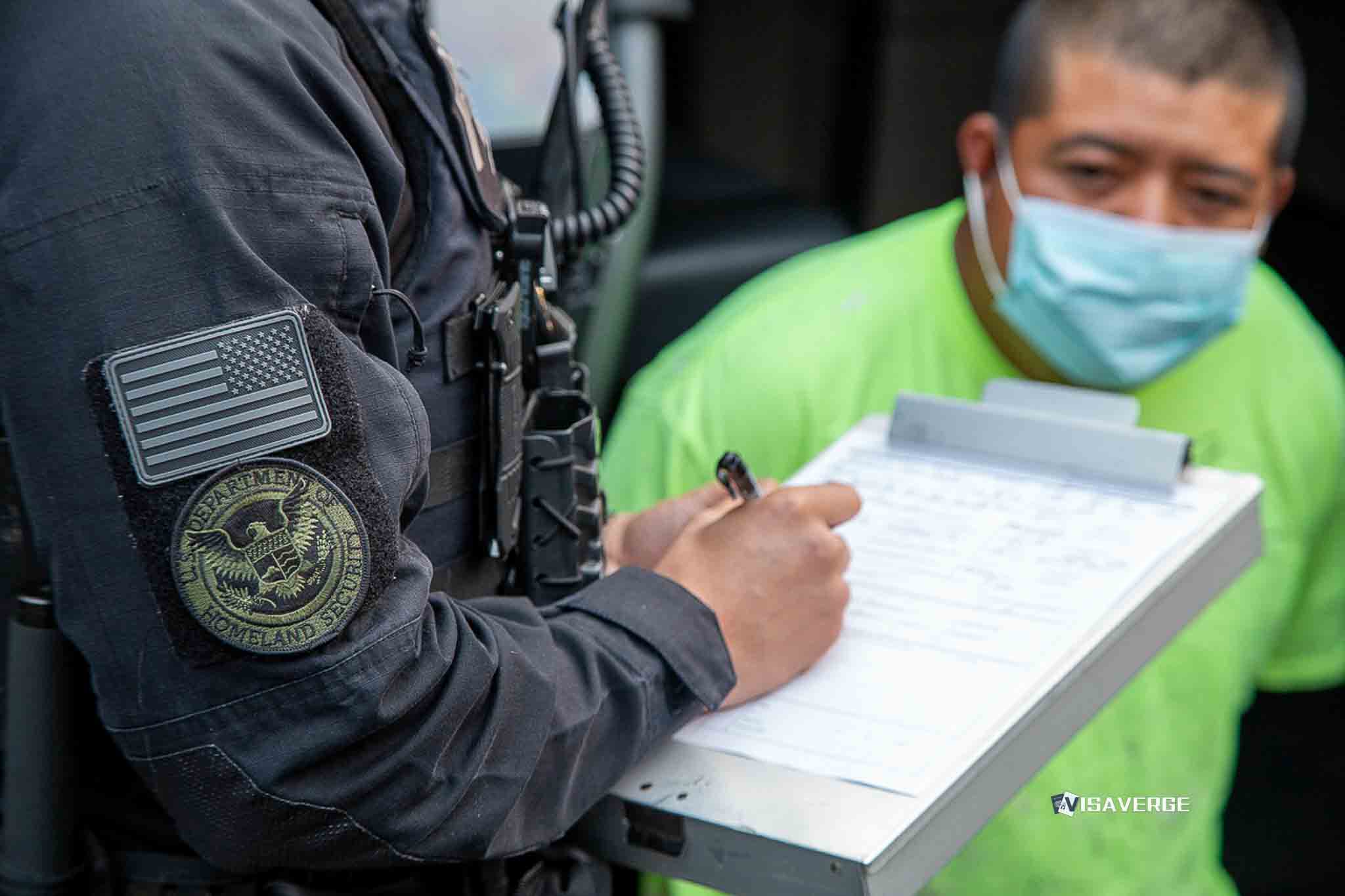A Surrey fish and chip shop owner faces a £40,000 fine from the UK Home Office after allegedly hiring a worker with a forged identity. The penalty, issued to Mark Sullivan of Big Fry Fish & Chips in Egham on July 22, 2025, highlights the growing risks for small business owners under the United Kingdom’s strict employer sanctions regime. This case brings new urgency to debates about fairness, compliance, and the future of immigration enforcement for businesses across the country.
A Costly Mistake for a Chippie Owner

Mark Sullivan, the chippie owner at the center of this case, says he followed standard hiring procedures when he brought on a new employee in early 2023. The worker provided a national insurance number, student loan repayment records, and housing benefit receipts—documents that many employers might see as proof of legal status. However, during a Home Office raid in March 2024, officials discovered the worker had used another person’s identity, including a forged passport.
The Home Office’s rules are clear: employers must see and verify original documents—such as a genuine passport or biometric residence permit—before anyone starts work. Copies of these documents must be kept for the entire period of employment and for two years after the job ends. Relying on secondary documents like NI numbers or benefit letters is not enough.
Sullivan says he paid the worker through HMRC’s PAYE system and saw no red flags. “We did everything by the book as far as we knew,” he explained. “There was nothing to suggest anything was wrong, and we cooperated fully with the authorities.” Despite this, the Home Office imposed a £40,000 fine—one of the largest penalties seen in recent months.
Why the Fine Was So High
The penalty reflects a major shift in the UK’s approach to illegal working. Since July 2023, the Home Office has issued 1,508 civil penalty notices, each potentially as high as £45,000 per illegal worker—triple the previous maximum of £15,000. The rules apply uniformly, regardless of whether a business is a large corporation or a small family-run shop.
Sullivan’s lawyer warned that appealing the fine could double it to £80,000 if the challenge failed. To avoid this risk, Sullivan paid a reduced amount of £28,000 within 21 days, receiving a £5,000 discount for cooperating with the investigation. He could have received a further £5,000 discount if he had reported suspicions to the UK Visas and Immigration hotline, but he insists there were no grounds for suspicion.
Employer Responsibilities: What the Law Requires
The UK Home Office expects all employers to:
- Check and verify original documents (such as a passport or biometric residence permit) before employment begins.
- Keep copies of these documents for the duration of employment and for two years after the employee leaves.
- Report any suspicions about a worker’s right to work to the UK Visas and Immigration hotline, which can reduce penalties if acted upon.
- Avoid relying on secondary documents like NI numbers, benefit letters, or student loan records, as these are not valid proof of right to work.
Employers who fail to follow these steps can face severe penalties, even if they acted in good faith or followed other standard procedures. The Home Office’s position is that only original ID documentation is valid for right-to-work checks.
For more details on what counts as a valid right-to-work check, employers can consult the official GOV.UK: Right to work checks guidance.
No Room for Honest Mistakes
One of the most controversial aspects of the current system is its strict liability approach. The penalty regime does not consider the size of the business, the employer’s intent, or whether the mistake was honest. The same fines apply to multinational companies and small local shops alike.
Craig Beaumont, Executive Director of the Federation of Small Businesses (FSB), criticized the policy: “Small employers are not immigration officers. They need a system that recognises genuine intent and treats them accordingly—not one that issues crushing fines that could threaten their survival.”
Legal experts agree that the appeal process is risky. If an employer challenges a fine and loses, the penalty can double. This leaves many small business owners feeling trapped—unable to fight what they see as unfair penalties, but unable to afford the cost of compliance mistakes.
Recent and Upcoming Policy Changes
Mark Sullivan hired a new employee
Home Office raid discovered forged identity
Fine issued to Mark Sullivan
New penalty structure introduced
Increased Immigration Skills Charge effective
The case against the chippie owner comes as the UK government tightens immigration enforcement even further. Key changes in 2024 and 2025 include:
- Higher Skills Thresholds: The minimum skill level for Skilled Worker Visas has increased to RQF 6 (graduate level), removing 112 previously eligible jobs at lower skill levels.
- Salary Thresholds: The minimum salary for general skilled workers has risen from £38,700 to £41,700.
- Increased Immigration Skills Charge: The fee employers pay to sponsor skilled workers will rise by 32% by the end of 2025.
- Stricter Language Requirements: Visa holders and their dependents must now meet higher English language standards.
- Care Worker Visa Route Closure: The route for new overseas care workers is now closed, with a transition period until July 2028 for extensions and switches.
These changes are part of a broader strategy to reduce net migration and encourage employers to hire from the domestic workforce. The government’s 2025 immigration white paper outlines these goals and the steps being taken to achieve them.
Enforcement and Compliance: A New Era
The Home Office has made enforcement a top priority. There are now more sponsor licence revocations, more unannounced raids, and more scrutiny of right-to-work checks than ever before. Employers must be able to show that they have conducted and documented original document checks for every employee.
The penalty structure does not allow for a sliding scale. There is no difference in fines for a small business with one employee or a large company with thousands. There is also no allowance for honest mistakes or lack of intent. This has led to growing calls for reform from business groups, MPs, and legal experts.
Despite these calls, as of July 2025, the Home Office has not announced any plans to introduce a more flexible approach or a sliding scale for penalties. The regime remains strict and highly punitive for all employers.
What This Means for Small Businesses
For small business owners like Mark Sullivan, the risks are clear:
- Life-changing fines can result from a single hiring mistake, even if the employer acted in good faith.
- No allowance for intent or business size means small shops face the same penalties as large corporations.
- Appealing fines is risky—if the challenge fails, the penalty can double.
- Compliance is complex and costly, especially for businesses without dedicated HR staff.
Many small business owners feel overwhelmed by the demands of the system. They worry that a single error could put them out of business. The FSB and other advocacy groups continue to push for a more balanced approach, but so far, the government has not responded.
Practical Steps for Employers
To avoid the fate of the chippie owner, all employers should:
- Always check original documents before hiring anyone. Do not accept copies, scans, or secondary documents.
- Keep clear records of every check, including the date, the person who conducted the check, and copies of the documents.
- Train staff on right-to-work checks and update procedures regularly to reflect changes in the law.
- Report any suspicions immediately to the UK Visas and Immigration hotline. This can reduce penalties if a problem is later discovered.
- Review official guidance regularly to stay up to date with the latest rules and requirements.
Employers can find detailed instructions and updates on the GOV.UK: Right to work checks page.
The Human Impact: Real Lives, Real Consequences
For Mark Sullivan, the £40,000 fine is more than just a financial blow. It threatens the future of his business, the jobs of his staff, and his own livelihood. “This has been devastating,” he said. “We’re just trying to run a small business and do the right thing. Now we’re facing a penalty that could close us down.”
His story is not unique. Across the United Kingdom 🇬🇧, small business owners are struggling to keep up with the demands of the immigration system. Many fear that honest mistakes could cost them everything.
As reported by VisaVerge.com, the strict enforcement regime has led to a surge in fines and a climate of fear among employers. Some businesses are now reluctant to hire anyone with a foreign-sounding name or background, worried that they might inadvertently break the rules.
Calls for Reform: What’s Next?
Business groups, legal experts, and some MPs are calling for urgent reform. They argue that the current system is unfair, inflexible, and puts too much pressure on small businesses. Suggestions for change include:
- Introducing a sliding scale for penalties that takes into account the size of the business and the nature of the mistake.
- Allowing for honest mistakes by reducing penalties where employers can show they acted in good faith.
- Providing more support and guidance for small businesses, including training and helplines.
- Simplifying the right-to-work check process to make it easier for employers to comply.
So far, the government has not announced any plans to change the system. Ongoing consultations may lead to some adjustments, but as of July 2025, the regime remains strict and the penalties severe.
What Should Employers Do Now?
Given the current climate, employers must take extra care when hiring new staff. The risks of getting it wrong are simply too high. Here are some practical steps:
- Review your hiring procedures to ensure you are checking original documents for every employee.
- Keep up to date with changes to immigration rules and right-to-work requirements.
- Seek legal advice if you are unsure about any aspect of the process.
- Contact the Home Office Employer Helpline (0300 123 4699) for support and guidance.
Employers can also join organizations like the Federation of Small Businesses for advocacy and practical help.
Conclusion: A Warning for All Employers
The case of the chippie owner fined £40,000 by the UK Home Office is a stark warning to all employers in the United Kingdom 🇬🇧. The rules are strict, the penalties are severe, and there is little room for error. Small businesses must treat right-to-work checks with the same care and attention as large corporations.
While calls for reform continue, the best protection for employers is to follow the law to the letter. Check original documents, keep clear records, and seek help when needed. The cost of a mistake can be devastating—not just for the business, but for everyone who depends on it.
For more information on right-to-work checks and employer responsibilities, visit the official GOV.UK: Right to work checks page. Stay informed, stay compliant, and protect your business from life-changing penalties.
Learn Today
Home Office → UK government department responsible for immigration, security, and law enforcement policies.
Right to Work Checks → Legal process employers use to verify a worker’s eligibility to work in the UK.
Civil Penalty Notice → A financial fine imposed on employers who hire workers without legal right to work.
Biometric Residence Permit → An official UK document proving a non-citizen’s legal right to live and work.
PAYE System → Her Majesty’s Revenue and Customs system for employers to pay employee taxes and National Insurance.
This Article in a Nutshell
A Surrey chippie owner faced a £40,000 penalty after unknowingly hiring an illegal worker using forged documents. UK law demands original document verification. Strict fines apply universally, risking small businesses’ survival. This case signals tougher immigration enforcement and urgent calls for balanced employer penalties nationwide, warning all employers to comply carefully.
— By VisaVerge.com








